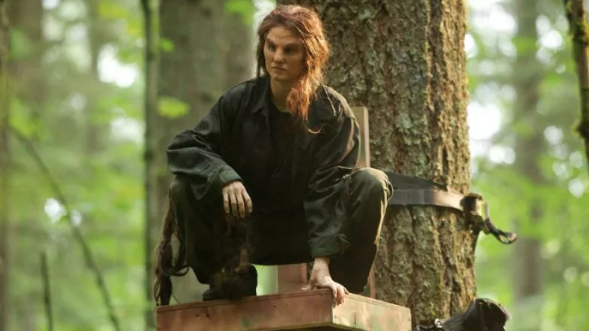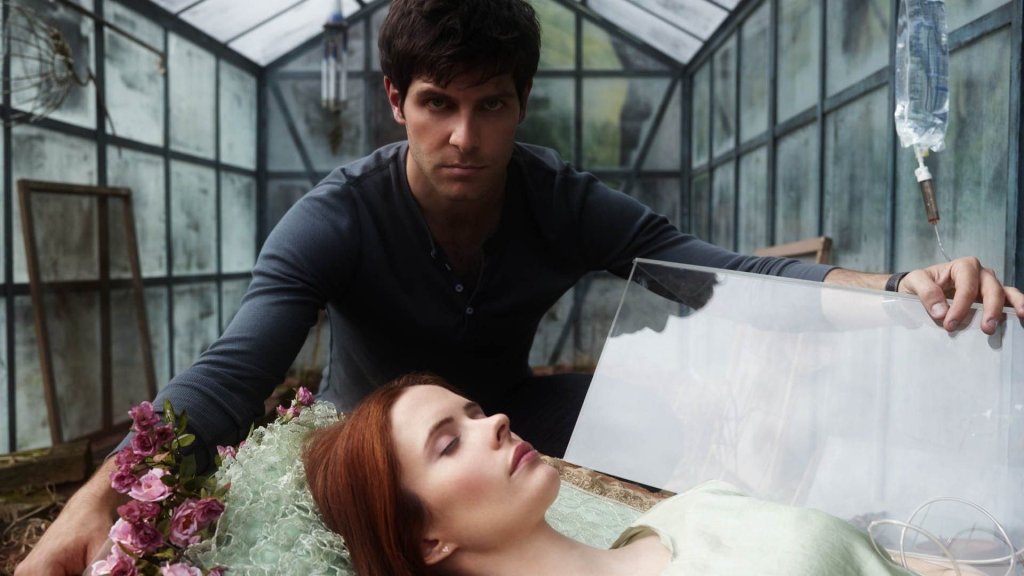Ask any parent if there’s a surefire way of getting children to do what they’re told and you’ll learn that there is only one true method – sheer terror. Logic or reason be damned, the only way to get a child to pay attention is to put the fear in them. Actually forget children, the only way to get anyone to do anything is to put the fear in them.
How many times have you been told to wait 45-minutes after eating before you go swimming? What exactly is the science behind this supposed common knowledge? Were our parents lying to us? Yes, yes they were. We were all raised to believe that the risk of being chewed up by an escalator or slowly drowning in quicksand are far greater than reality would have it.
As the great Paul Maud’Dib Atreides said “fear is the mind-killer”. And Fairytales have been doing this for centuries. Fairytales are ancient, cautionary stories; didactic aphorisms designed to instil obedience in children through the only medium that will get them to pay attention – gut-wrenching terror.
For instance, the original Grimm’s Fairy Tales contained 211 stories and, while there are some classics in there such as Snow White or Cinderella, the vast majority of these fables are just a variation of “there once was a child who didn’t do as their parents said, so they were horribly killed by monsters. The end. Sleep tight.”
Most of the fairytales you grew up with were much more sinister in the past and so, submitted for your consideration, here are five of the darker original version of fairy tales you think you know.
Little Red Riding Hood
“Oh what big teeth you have” the familiar refrain goes from this ancient tale of poor facial recognition. Red Riding Hood finally realises that her grandmother has been consumed by the Big Bad Wolf and is saved at the last moment by a heroic woodsman. Only that’s not how the story originally went.
There are multiple versions of Little Red Riding Hood that predate our relatively modern desire for a happy ending.
There’s the version where the wolf replies “all the better to eat you with” and then eats Little Red Riding Hood. The end.
Perhaps most disturbing though is the version where it is revealed that Little Red Riding Hood left the door unlocked so that the wolf can eat grandma, then called the woodsman to kill the wolf, leaving Little Red Riding Hood with an estate in the country and all of grandma’s inheritance, having engineered the whole situation like a Little Red Keyser Soze.

Rapunzel
A lot of these fairytales feature witches taking first born children as currency, like they were the blockchain of the middle ages. Rapunzel is no exception.
Kept in a high tower by a witch, who is presumably waiting for her value to increase like blockchain, Rapunzel’s long hair is the only way in and out of said tower. One day a travelling prince hears Rapunzel singing from afar and decides that he just has to get to know her better.
In the modern version it’s love at first sight but, as you might have guessed, the original Grimm version of this story isn’t quite as saccharine. The prince keeps coming back, if you catch my drift. The two star-cross’d lovers are only discovered when Rapunzel, being home-schooled, innocently asks the wicked witch why all of her clothes are getting tighter and her belly is getting bigger.
The witch is enraged, seeing the value of her bitcoin princess falling and cuts off Rapunzel’s hair, laying a trap for the errant prince. When the prince next climbs the tower, the witch lets go of the hair and the prince falls a number of stories into a thornbush, which breaks his back and gouges out his eyes. It’s the little details that make a story.

Baba Yaga
No, not John Wick. The original Baba Yaga who shares very few similarities with John Wick and may or may not be more terrifying depending on whether or not you’ve killed John Wick’s dog.
Baba Yaga is an old crone who lives in a house that runs around on chicken legs and has a magic mortar and pestle that she can fly through the night in. Like John Wick, she can be either deadly or helpful – Baba Yaga was known to aid travellers, although usually in a roundabout way, but she was also known to kill and eat said travellers, depending on her mood.
Baba Yaga appears as the fairy godmother in the Russian version of Cinderella. In this tale, the Russian Cinderella, Vasilisa the Beautiful, is cast out of her home by her wicked stepsisters. They send her into the forest hoping that she will run afoul of Baba Yaga.
However, Baba Yaga doesn’t immediately kill and eat Vasilisa, instead giving her the seemingly impossible task of separating and cataloguing individual grains of rice before sunrise.
When Vasilisa accomplishes this, Baba Yaga grants her a magical skull which guides Vasilisa out of the forest and back to her home. The skull then breaths magical hellfire and burns Vasilisa’s evil stepsisters to death in an act of vengeful, if brutal, justice.
Uh, just like John Wick.
Snow White
The Disney version of Snow White follows the original storyline a lot more closely than most of the others, the basic plot is essentially the same. There are a few crucial points that were left out for modern sensibilities however.
Firstly, it isn’t Snow White’s evil step-mother who is the dastardly evil queen, but her mother. Secondly, the queen’s jealousy of Snow White wasn’t entirely unfounded – the king, her husband and Snow White’s father, had begun to feel “desirous” of the young girl’s beauty. Yeah.
The queen didn’t just ask for Snow White’s heart in a jewelled box either, she also wanted the poor girl’s lungs and liver as proof that she was dead. You want to be sure of these things.
When Snow White happens upon the cottage of the seven dwarves, the dwarves don’t adopt Snow White out of the goodness of their hearts. They enslave the poor girl. This wasn’t a reciprocal bartering of services, it was forced, indentured servitude.
The rest of the tale plays out mostly the same way, until the wedding day between Snow White and her charming prince.
The queen, enraged that Snow White still lives, shows up at the wedding and once more tries to kill Snow White. The prince, growing tired of such shenanigans, orders his men to apprehend the evil queen. He then has red-hot iron shoes nailed to her feet and orders her to dance until she dies, as entertainment for the wedding guests.
Look, this was pre-karaoke. Weddings were different back then.
Pinocchio
The tale of the loveable puppet and his famously telescoping nose. Only the original version of Pinocchio wasn’t such a loveable and innocent character at all. Pinocchio was actually a pretty horrible person, more akin to a Chucky Doll.
Upon first meeting Jiminy Cricket, instead of taking the sage advice of this wise insect, Pinocchio rankles at the thought of someone telling him what to do. So he picks up a hammer and bludgeons Jiminy Cricket to death.
Then, tired from all that hammer murder, Pinocchio sits in front of a fire and falls asleep. As he sleeps his feet are too close to the fire and burn off.
Pinocchio, now crippled, is distraught. His maker and foster-father, Gepetto, takes pity on Pinocchio and builds him a new set of feet. As thanks for this Pinocchio runs away and tells police that Gepetto was abusing him. Gepetto is sent to prison and Pinocchio inherits the now vacant estate.
Later, Pinocchio falls in with the wrong crowd and tries to join a death cult of highway bandits who rob and murder travellers.
At this point, the ghost of Jiminy Cricket shows up and warns Pinocchio not to go along with the bandits, but rather than heed this warning Pinocchio murders Jiminy Cricket’s ghost.
Pinocchio joins the bandits, who promptly betray him and hang him from a tree. As Pinocchio swings from a branch, the life slowly ebbing from him, he finally repents his life of crime just before his death, because that’s what constituted a happy ending back in the day.
—












